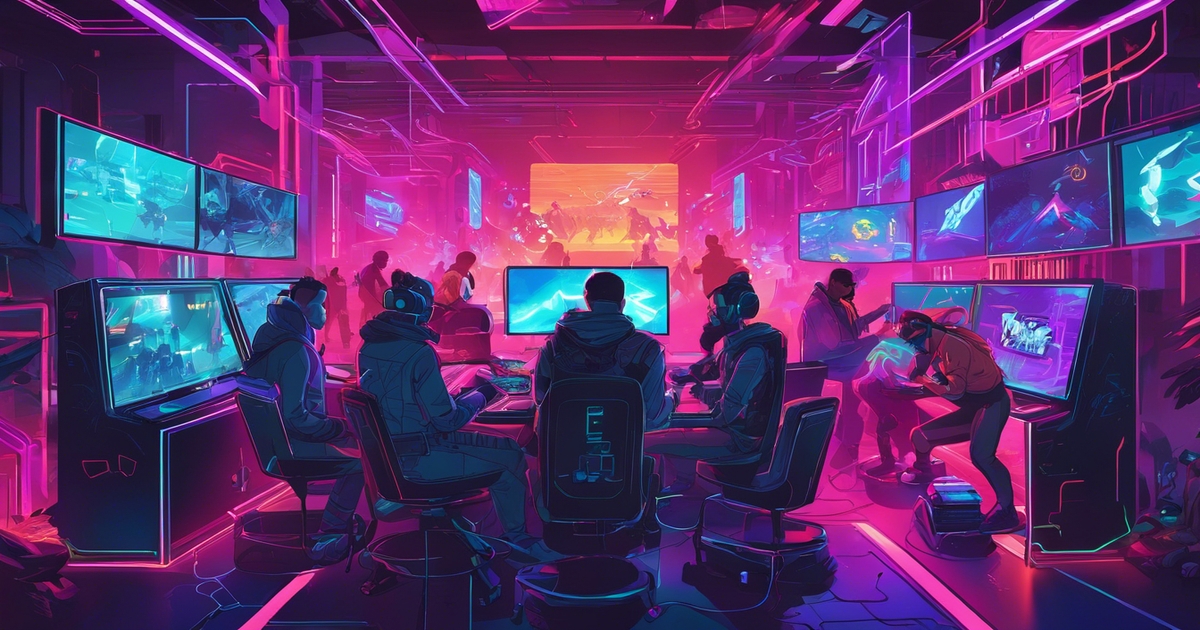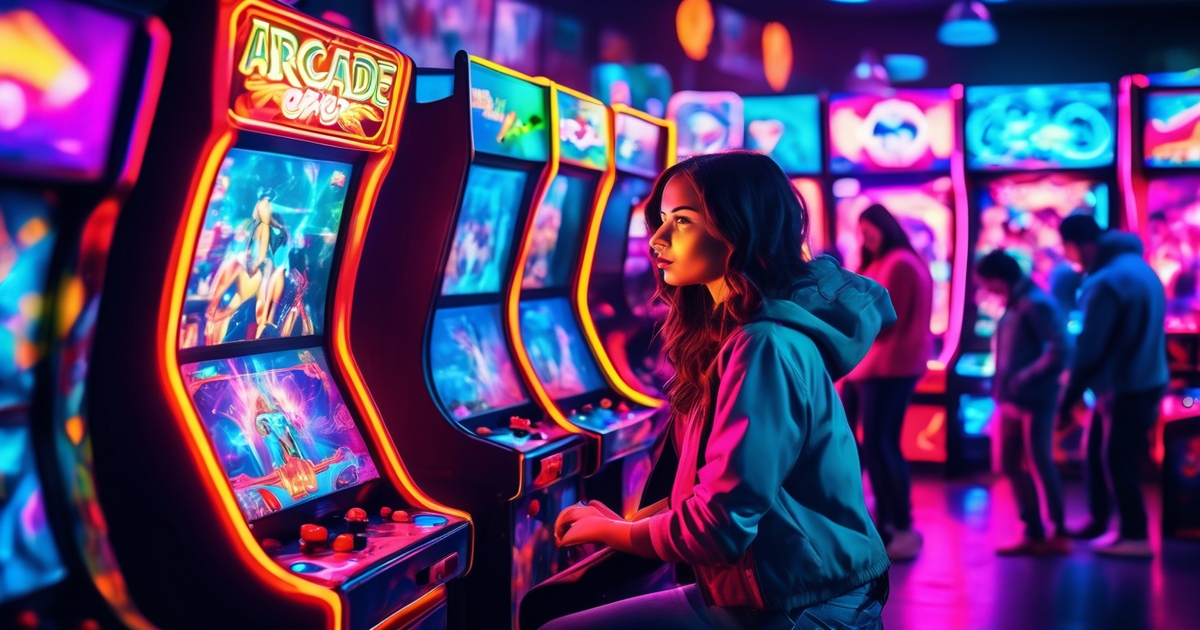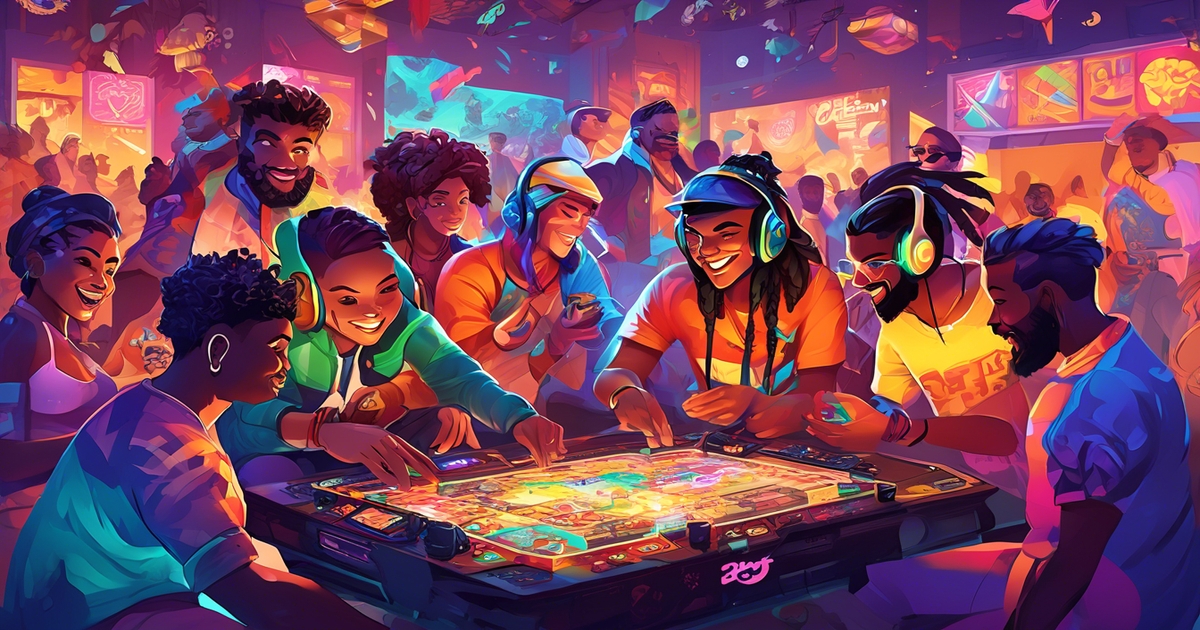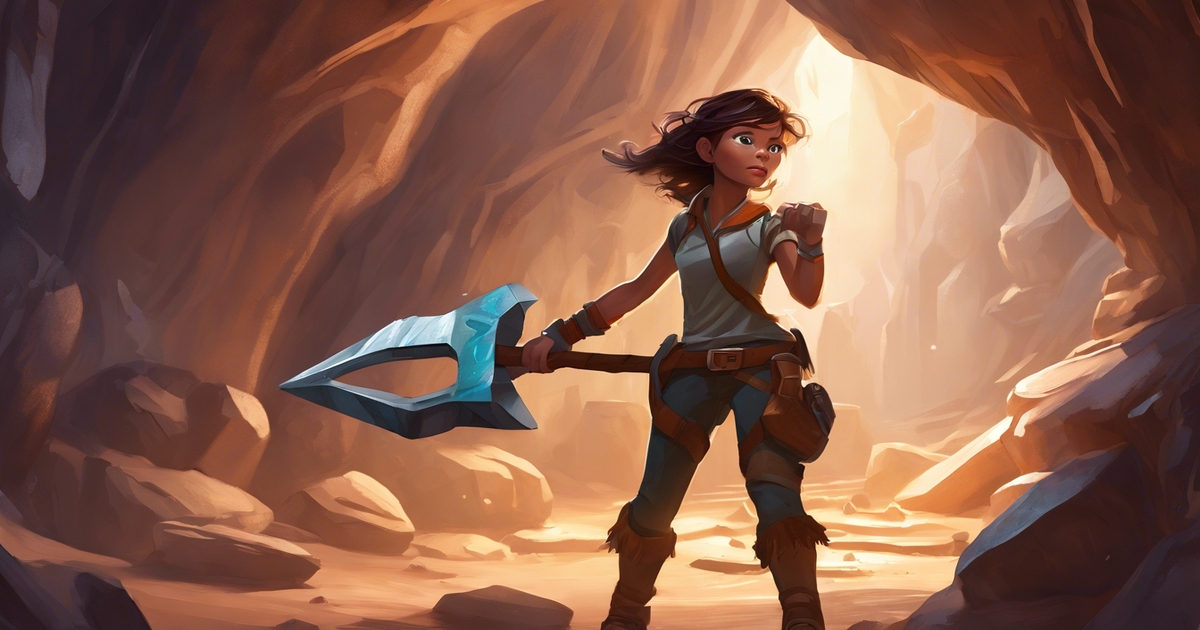Video Game Culture: Rise of A New Community

- The Evolution of Video Game Culture
- The Cultural Significance of Gaming
- Films and Other Media Influenced by Video Games
- Online Gaming Communities and Culture
- Social Issues and Advocacy in Gaming
- The Rise of Esports and Gaming Celebrities
- Video Games as a Platform for Artistic Expression
- Gaming’s Impact on Society and Culture
- The Future of Video Game Culture and Entertainment
- Final Remarks
- Frequently Asked Questions
Did you know that there are over 2.7 billion gamers worldwide? Video game culture has seen a significant rise in recent years, with more people than ever before joining the gaming community.
From casual mobile gamers to competitive eSports professionals, the world of gaming has become a vibrant and diverse community, bringing people together from all walks of life.
In this article, we will explore the evolving landscape of video game culture and the impact it has had on creating a new, connected community.
The Evolution of Video Game Culture

From Arcade Machines to Virtual Reality
Video game culture has evolved significantly over the years, largely due to the remarkable technological advancements in gaming. In the early days, arcade machines were the primary medium for gaming. Players would flock to arcades, pop in a few coins, and immerse themselves in games like Pac-Man and Space Invaders. However, with the advent of home consoles such as Atari and Nintendo Entertainment System (NES), gaming became more accessible to a wider audience.
The introduction of virtual reality (VR) has revolutionized gaming experiences by offering an unprecedented level of immersion. Players can now step into virtual worlds and interact with environments in ways that were once unimaginable. VR headsets like Oculus Rift and PlayStation VR have brought about a new era of gaming, blurring the lines between reality and fiction.
The evolution from arcade machines to VR technology showcases how video game culture has been shaped by continuous innovation, making it more immersive and engaging than ever before.
Impact of Iconic Games on Early Video Game Culture
Iconic games like Pac-Man and Super Mario have played pivotal roles in shaping early video game culture. These games not only entertained players but also established fundamental elements that continue to influence modern video games.
Pac-Man’s simple yet addictive gameplay captivated audiences worldwide during its release in 1980. The widespread popularity of this game contributed significantly to establishing video games as a mainstream form of entertainment. Similarly, Super Mario emerged as a cultural phenomenon with its charming characters, vibrant worlds, and innovative gameplay mechanics. Its impact transcended the realm of gaming, influencing popular culture through various adaptations such as cartoons and merchandise.
These iconic games served as cornerstones for early video game culture by captivating audiences across different age groups while laying foundations for future innovations within the industry.
Shift from Single-Player to Multiplayer Experiences
The shift from single-player experiences to multiplayer interactions has fundamentally transformed gaming culture. While single-player games offer immersive narratives tailored for individual experiences, multiplayer games introduce social dynamics that foster collaboration or competition among players.
Games like World of Warcraft introduced massive online communities where players could embark on epic quests together or engage in fierce battles against one another. This transition towards interconnected gameplay experiences led to the emergence of esports – organized competitive events where professional gamers compete at an elite level.
The Cultural Significance of Gaming

Diverse Representation and Inclusivity
Video game culture has evolved to embrace diverse representation and inclusivity, reflecting the real world’s rich tapestry. Games now feature characters from various ethnicities, genders, and sexual orientations, fostering a sense of belonging for all players. For example, in “The Last of Us Part II,” players navigate through the post-apocalyptic world as Ellie, a young woman who is gay. This level of representation not only reflects societal diversity but also promotes empathy and understanding among gamers.
Gaming has influenced fashion with its iconic character outfits inspiring clothing lines and streetwear trends. Music in games often becomes popular outside the gaming community; for instance, songs from “Grand Theft Auto” soundtracks have found their way onto mainstream radio stations. Video game language has seeped into everyday conversations – terms like “level up,” “respawn,” or “game over” are commonly used by people regardless of whether they play games or not.
Fostering Global Connections
Through gaming, individuals from different corners of the globe connect on multiplayer platforms to collaborate or compete in virtual worlds. This fosters cross-cultural interactions as players communicate with peers from diverse backgrounds while strategizing or simply having fun together. For instance, a player based in Japan might team up with someone from Brazil to achieve common objectives within a game like Fortnite or Overwatch. These interactions go beyond just playing; they involve sharing experiences and creating friendships that transcend geographical boundaries.
Gaming also serves as an educational tool about different cultures by immersing players in historically accurate settings or storylines inspired by various traditions around the world. Games such as Assassin’s Creed series provide detailed historical contexts set across different eras and locations including Renaissance Italy, ancient Greece, Viking Age Norway etc., offering insights into these cultures’ architecture, customs, and ways of life.
Films and Other Media Influenced by Video Games

Rise of Film Adaptations
The video game culture has significantly impacted other forms of media, leading to the rise of film adaptations from popular video game franchises. Movies such as “Resident Evil” and “Tomb Raider” have successfully transitioned from the gaming world to the big screen, captivating audiences with their thrilling narratives and iconic characters. These adaptations have bridged the gap between video games and mainstream entertainment, attracting both gamers and non-gamers alike.
These films exemplify how video games have become a source of inspiration for storytelling in different mediums. The success of these adaptations has demonstrated that there is a substantial demand for content that originates from the rich narratives found within popular video game titles.
Integration into Mainstream Media
The integration of video game elements into mainstream media and entertainment has further solidified the influence of gaming culture on society. Television shows like “The Witcher” draw inspiration from critically acclaimed video games, bringing their immersive worlds to life on screen. This integration not only appeals to existing fans but also introduces new audiences to the captivating narratives present in these beloved games.
Moreover, advancements in technology have enabled filmmakers to recreate fantastical settings seen in video games, blurring the line between fantasy and reality. As a result, viewers are treated to visually stunning landscapes that were once confined solely within gaming environments.
Impact on Narrative Structure
The impact of video game storytelling techniques on narrative structure in movies and TV shows is undeniable. The nonlinear storytelling prevalent in many modern-day video games has influenced filmmakers to experiment with unconventional narrative structures, creating engaging storylines that keep audiences captivated.
For instance, some movies now incorporate flashback sequences or alternate storylines reminiscent of interactive storytelling found in certain final fantasy-like RPGs or open-world adventure games. This approach allows viewers to experience stories through multiple perspectives, similar to how players interact with diverse characters and viewpoints within various video game genres set in virtual universes mirroring our own real world experiences.
Online Gaming Communities and Culture
Redefining Social Interaction
Online spaces like forums, streaming platforms, and social media have become pivotal hubs for video game culture. These platforms provide a space for gamers to connect, share experiences, and discuss strategies. Through these online communities, players from different parts of the world can come together to form friendships based on their shared passion for gaming.
Gone are the days when gaming was seen as a solitary activity. Now, it has redefined social interaction by allowing players to communicate with each other in real-time while playing games or through dedicated chat channels. This has created a sense of camaraderie among gamers who may never meet in person but feel connected through their virtual adventures.
The emergence of online forums and streaming platforms has not only facilitated communication but also fostered an environment where players can learn from one another. For instance, if someone is struggling with a particular level in a game, they can seek advice from more experienced players within these communities.
Anonymity’s Impact
Anonymity plays both positive and negative roles in video game culture. On one hand, it allows individuals to express themselves freely without fear of judgment based on factors such as age, gender, or physical appearance. This freedom encourages open discussions about various aspects of gaming without bias.
However, anonymity also opens the door to negative behaviors such as trolling and cyberbullying within these communities. Some individuals take advantage of this lack of accountability to engage in disruptive or harmful activities that can negatively impact others’ experiences.
While anonymity promotes inclusivity by removing superficial judgments often present in face-to-face interactions, it simultaneously creates opportunities for toxic behavior that can harm the overall community experience.
Social Issues and Advocacy in Gaming
Promoting Diversity
Video game culture has been making strides in addressing diversity and representation. Games are now featuring a more diverse range of characters, representing different genders, races, and backgrounds. This inclusivity allows players to feel represented and included in the gaming community. For example, games like “The Last of Us Part II” have received praise for their portrayal of LGBTQ+ characters.
Advocacy groups play a crucial role in promoting mental health awareness within the gaming industry. They provide resources for gamers struggling with mental health issues, emphasizing the importance of seeking help when needed. These groups also work to reduce the stigma surrounding mental health challenges among gamers.
Tackling Controversies
Controversies surrounding gender equality, harassment, and discrimination have been significant concerns within gaming culture. Advocacy groups have taken steps to address these issues by raising awareness about respectful behavior and creating safe spaces for all gamers. For instance, initiatives like the “Women in Games” movement aim to empower women in the gaming industry while combatting stereotypes and discrimination.
In addition to gender-related controversies, advocacy groups focus on combating toxic behavior such as bullying or harassment that can occur within online gaming communities. By providing educational resources and promoting positive interactions through campaigns like #GamersUniteAgainstHate, these groups strive to foster a welcoming environment for all players.
The Rise of Esports and Gaming Celebrities
Evolution: Competitive Gaming to Global Phenomenon
Competitive gaming, or esports, has evolved from a niche hobby into a global phenomenon. Professional leagues and tournaments now draw massive audiences, with millions of viewers tuning in to watch their favorite teams and players compete. This evolution has transformed video game culture, elevating it to the same level as traditional sports in terms of popularity and recognition. As a result, esports has gained mainstream acceptance and legitimacy as a competitive activity.
Esports’ impact on mainstream sports culture is undeniable. Traditional sports organizations have taken notice of the immense popularity of esports and have started investing in this burgeoning industry. For example, several NBA teams have established their own esports franchises to compete in popular titles like “NBA 2K.” Sponsorship deals from major brands such as Coca-Cola, Intel, and Red Bull further validate the influence of esports on pop culture.
Influence: Gaming Personalities as Celebrities
The rise of influential gaming personalities has played a significant role in shaping video game culture. These individuals have transcended the boundaries of gaming to become celebrities with substantial influence over pop culture trends. From professional gamers known for their exceptional skills to content creators who entertain millions on platforms like YouTube and Twitch, these figures are revered by dedicated fan bases around the world.
Gaming celebrities not only attract attention within gaming circles but also garner international recognition through collaborations with renowned brands outside the gaming industry. For instance, Tyler “Ninja” Blevins became one of the most recognizable faces in gaming after streaming “Fortnite” gameplay sessions on Twitch. His success led to partnerships with major companies such as Adidas and Samsung.
Video Games as a Platform for Artistic Expression
Visual Design
Video games serve as a captivating canvas for artistic expression through their visually stunning designs. From the breathtaking landscapes of open-world adventures to the intricate character animations, video game developers use graphics to evoke emotions and immerse players in rich, imaginative worlds. For example, mobile games like Monument Valley showcase how visual design can be used to create surreal and mesmerizing experiences that resonate with players on an artistic level.
Indie game development has further pushed the boundaries of visual artistry in gaming by introducing unique art styles and unconventional aesthetics. These indie titles often prioritize creativity over commercial appeal, allowing developers to experiment with diverse visual elements that challenge traditional norms. As a result, independent studios have played a pivotal role in expanding the spectrum of visual storytelling within video game culture.
Music Composition and Storytelling
The fusion of music composition and storytelling in video games has elevated them into immersive narrative experiences that rival other forms of entertainment. Game soundtracks are meticulously crafted to enhance emotional depth, heighten tension during gameplay, and establish atmospheric ambiance. For instance, self-composed musical scores for video games not only set the tone but also elicit powerful emotional responses from players.
Moreover, storytelling in video games has evolved into complex narratives that delve deep into themes such as love, loss, heroism, and redemption. The interactive nature of gaming allows players to become active participants in these stories rather than passive observers – creating an unparalleled sense of engagement with the characters’ journeys.
Conveying Emotional Experiences
One remarkable aspect contributing to video game culture is its ability to convey profound emotional experiences through interactive gameplay. Unlike passive forms of media consumption like watching movies or reading books where audiences merely observe events unfold before them; playing emotionally charged games allows individuals to actively engage with the content on a personal level.
Gaming’s Impact on Society and Culture
Influence of Video Games
Video game culture has significantly influenced technology adoption, digital literacy, and educational applications. Video games have driven technological advancements, leading to the development of powerful graphics cards, processors, and other hardware components. This has not only enhanced gaming experiences but also spurred innovation in various industries such as healthcare, engineering, and entertainment.
Moreover, video games have played a pivotal role in promoting digital literacy among individuals of all ages. Players often need to navigate complex interfaces and make strategic decisions within the game environment. These skills translate into real-world abilities that are highly sought after in today’s technology-driven society.
In addition to this, educators have begun recognizing the potential of video games as effective educational tools. Games like Minecraft are being used to teach subjects such as history or physics while fostering creativity and problem-solving skills among students.
Addressing Misconceptions
It is important to address misconceptions about the correlation between violence in video games and real-world behavior. While some studies suggest a link between violent video games and aggressive thoughts or behaviors in players, it is crucial to note that these findings do not imply causation. Many factors contribute to an individual’s behavior, including upbringing, social environment, mental health conditions, and more.
Furthermore, studies have shown that there is no conclusive evidence proving that playing violent video games directly leads to criminal activities or violence in society at large. It’s essential for people not to generalize based on isolated incidents without considering broader societal influences.
Economic Impact of Gaming Industry
The gaming industry has had a substantial economic impact on job creation,tourism,and entertainment sectors.The industry creates numerous job opportunities ranging from game development,digital marketing,to esports management.It also attracts tourists through events like gaming conventions,tournaments,and expos which can boost local economies by increasing tourism revenues.Furthermore,the rise of streaming platforms dedicated solely to gaming content has revolutionized the entertainment sector,giving rise new forms media consumption,such as live streaming,gaming podcasts,and online communities centered around specific titles.
The Future of Video Game Culture and Entertainment

Advancements in Immersive Experiences
The future of video game culture holds exciting potential, especially with anticipated advancements in virtual reality (VR), augmented reality (AR), and immersive gameplay experiences. Imagine being fully immersed in a virtual world where you can interact with objects and characters as if they were real. With the continuous development of VR technology, players will soon be able to experience games like never before. For instance, exploring ancient civilizations or even solving puzzles within a fantasy realm could feel incredibly lifelike.
In addition to VR, AR is also set to transform the gaming landscape by blending digital elements with the real world. This means that players could engage in epic battles right in their living rooms or go on treasure hunts through city streets using their smartphones. These advancements are not only about creating more engaging games but also about revolutionizing how we perceive entertainment itself.
Societal Shifts Driven by Gamification Trends
The evolution of video game culture is expected to drive potential societal shifts through gamification trends across various domains such as education, healthcare, and workplace environments. In education, teachers are already leveraging gamified learning platforms to make subjects more engaging for students. By incorporating game mechanics into lessons, students can enjoy learning while improving their problem-solving skills and knowledge retention.
Similarly, healthcare providers are exploring ways to utilize gaming principles for patient treatment and therapy. From physical rehabilitation exercises disguised as interactive games to mental health applications that promote relaxation through gameplay techniques – the possibilities are vast.
Moreover, workplaces are beginning to adopt gamified approaches for training programs and employee engagement initiatives. By integrating elements from video game culture like rewards systems and progress tracking into professional settings, companies aim to enhance motivation levels among employees while fostering a collaborative environment.
Evolution of Storytelling and Community Engagement
Looking ahead at the future of video game culture also involves forecasting the evolution of storytelling methods within games along with heightened interactivity and community engagement opportunities. As technology continues to advance rapidly over time—bringing forth increasingly sophisticated graphics capabilities—game developers will have greater freedom when crafting intricate narratives that captivate players’ imaginations.
Furthermore, the concept of community engagement within video game culture is likely to expand exponentially. Online multiplayer experiences already allow gamers from around the globe to connect virtually, but this trend may evolve further, enabling deeper social interactions, creative collaborations, and shared experiences within expansive virtual worlds.
Final Remarks
Congratulations! You’ve just embarked on an exhilarating journey through the multifaceted world of video game culture. From its humble beginnings to its current status as a global phenomenon, we’ve explored the profound impact of gaming on art, society, and entertainment. As you ponder the future of video game culture and entertainment, remember that you are an integral part of this vibrant community. Whether you’re a casual player, an avid fan, or a curious observer, your unique perspective and participation shape the ever-evolving landscape of gaming. Embrace the opportunities to engage with diverse gaming experiences, champion positive change within the community, and celebrate the boundless creativity that thrives in this dynamic realm.
Now, go forth and continue your exploration of video game culture with a renewed sense of appreciation and understanding. Your insights and contributions hold the power to enrich this thriving ecosystem even further. Game on!
Frequently Asked Questions
What is the significance of video game culture?
Video game culture has evolved into a significant social phenomenon, shaping entertainment, art, and technology. It influences diverse media and fosters online communities while also impacting societal issues.
How do video games contribute to artistic expression?
Video games serve as a unique platform for artistic expression through storytelling, visual design, music, and interactive experiences. They blend elements of traditional art forms with technological innovation to create immersive worlds.
Why are esports and gaming celebrities on the rise?
Esports’ competitive nature attracts a growing audience seeking entertainment beyond traditional sports. Gaming celebrities emerge due to their exceptional skills or entertaining personalities in this rapidly expanding industry.
What impact does video game culture have on society?
Video game culture influences societal norms, behaviors, and perceptions by addressing social issues and advocating for diversity. It shapes popular trends in entertainment while fostering inclusive communities worldwide.
How will video game culture continue to evolve in the future?
The future of video game culture promises further integration with advanced technologies like virtual reality and augmented reality. This evolution will expand gaming’s influence across various aspects of society and entertainment.
